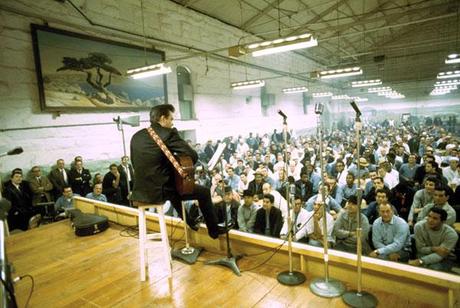
By Alan Bean
This fascinating essay touches on Johnny Cash’s lifelong prison ministry. (It was produced for the BBC, which explains the funny spelling). It may sound odd to hear songs about “kickin’ and a-gougin’ in the mud, and the blood and the beer” characterized as a ministry, but that’s exactly what they were. I purchased Johnny Cash at Folsom Prison a few years ago thinking this was the only prison album he recorded and likely the only prison concert he performed. Not so. He recorded two prison albums and performed at prisons across the United State throughout his 30-year career.
Johnny Cash is one of the few musicians who is adored by rednecks and bleeding heart liberals alike. He sang about love and pain and family, themes dear to the conservative heart; but his repertoire also tackled injustice, racism and the need for reform. You don’t get that combination much anymore. If the virtues of both sides of the great American culture war could be combined, they’d look and sound a lot like the Man in Black.
Cash could combine conservative and liberal themes because he got his start in the 1950s and 60s, a time when prisons were deplorable by today’s standards but incarceration rates in the United States were much lower than today. The prison boom in the 1980s was inspired, in part, by a desire to reduce prison crowding. But as we built more prisons, the prisoners just kept coming.
Cash’s call for prison reform was largely a cry for mercy and a second chance. He didn’t want people who had made a single foolish mistake locked up with career criminals. He advocated alternatives to incarceration. He did all of this because God gave him no choice. In short, Johnny Cash was a prophet of God, his reputation as a real bad dude notwithstanding.
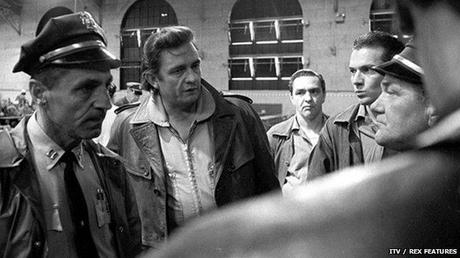
Johnny Cash and his prison reform campaign
By Danny RobinsBBC World Service, Arkansas
US country music star Johnny Cash was well-known for his activism on prisoners’ rights – but what impact did he actually have on the prison system?
On 26 July 1972, three grizzled-looking men dressed uneasily in suits gave evidence at a US Senate subcommittee on prison reform. Two of the men were former inmates of some of the toughest prisons in the US – the third was the country and western singer, Johnny Cash.
Cash’s famous live albums recorded at Folsom Prison and San Quentin are the stuff of music legend – likely to feature on any critic’s list of defining albums of the 1960s.
But it’s much less well-known that these were only two of many prison concerts Cash played over the course of almost 30 years.
Fitting the gigs in around his relentless touring schedule, the “Man in Black” performed for inmates all over the US, always unpaid, and in the process, became a passionate and vocal spokesman for prisoners’ rights.
“He always identified with the underdog,” says Tommy Cash, Johnny’s youngest brother.
“He identified with the prisoners because many of them had served their sentences and had been rehabilitated in some cases, but were still kept there the rest of their lives. He felt a great empathy with those people.”
The roots of Cash’s empathy lie as far back as 1953, when as a 21-year-old radio operator in the US Air Force, he saw the film Inside the Walls of Folsom Prison and was inspired to write a song.
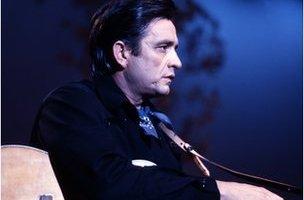
Folsom Prison Blues, released two years later, after Cash had signed to Sun Records, turned the young singer into a star.
The song, and in particular the now-notorious line “I shot a man in Reno, just to watch him die,” was sung with such raw menace that many assumed Cash knew what he was talking about.
“There’s people today that you can talk to and they will believe that he actually did that,” says WS “Fluke” Holland, Johnny’s larger-than-life former drummer.
“Johnny Cash shot a man to watch him die. He was a mean dude,” he chuckles then shakes his head. “The only time he was in prison is when we played in them.”
This is one of the ironies of Cash’s prison reform crusade. The very thing that made convicts connect with him, and US senators hang on his every word – the air of authenticity that stemmed from the belief he had served hard time himself – was in reality a misconception.
“Cash had been behind bars,” says his biographer Michael Streissguth. “But these were one-night stays in jail after drunk and disorderly arrests.”
His popularity, fuelled by the desperado image, made him a refreshing antidote to the clean-cut pop stars of the era. Cash did little to dispel the growing myth around him.
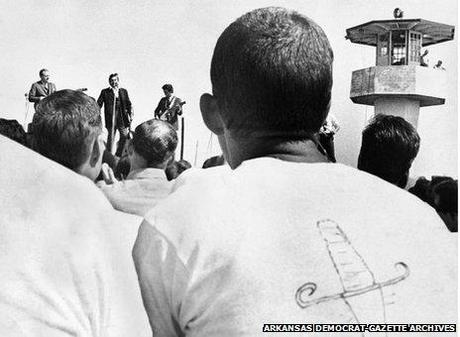
One result was that he began to receive invitations to perform in prisons. He played his first prison concert in 1957 at the Huntsville State Prison in Texas. Many more followed.
The unique energy of these appearances was captured in 1968 on the At Folsom Prison recording. The album cemented Cash’s outlaw image and reignited his career, which had been floundering in the mid-60s as he battled drug addiction.
Columbia Records, which had only reluctantly agreed to Cash’s request to record at the prison and then half-heartedly marketed the release, was taken aback. But Cash had undeniably caught the public mood.
The growing civil rights movement had put the thorny issue of how to deal with America’s huge prison population firmly on the agenda.
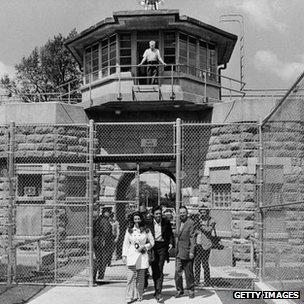
“In the 1960s in America, there was a growing realisation that prisons were ineffective,” says Streissguth. “They were merely training inmates to be better criminals. So the recidivism rate, people coming back to incarceration, was very high.”
Cash, an ardent believer in the power of rehabilitation over punishment, became the go-to voice for the media on this new hot topic.
“I think Cash had a feeling that somehow he had been endowed with this fame in order to do something with it, and one of the ways he could do something with it was talking about prison reform,” says Streissguth, who also believes Cash’s deeply-held religious beliefs were a factor in his championing of the cause. “He connected with the idea that a man could be redeemed.”
If American prisons were failing, nowhere was this more true than in Cash’s home state of Arkansas.
By 1970, the entire state penal system had been declared “unconstitutional” by a federal judge, after a series of scandals throughout the 60s involving the physical and sexual abuse of inmates, torture, inadequate living conditions and the outdated and corrupt “trustee system”.
“Trustees were prisoners guarding other prisoners,” says Colin Woodward from the UALR Center for Arkansas History and Culture. “It really echoed the way people worked under slavery. Under slavery a lot of the time the slave drivers were actually slaves themselves and that’s what’s replicated here.”
Clearly, a system where armed prisoners policed their fellow inmates in the absence of any civilian guards was massively open to abuse.
“It was the closest thing to hell this side of hell,” says Daniel Merry, a folk singer in his own right, as he remembers life in Cummins, then the worst of Arkansas’s prisons and arguably one of the worst in the world at that time.
Merry, now in his 60s, was sent to Cummins for eight months in 1969 for the crime of marijuana possession. “I’d say life down there on a daily basis was pretty scary,” he says.
“I seen a lot of inmates get killed. One of their favourite ways was to give you what they call a ‘blanket party’. When you go to sleep, a bunch of old things run up and throws a blanket over you and sticks a bunch of homemade knives in you.”
When Johnny Cash and his touring roadshow arrived to perform at Cummins in April 1969, it must have seemed like a rare ray of light to inmates such as Daniel Merry.
Cash came at the invitation of Winthrop Rockefeller, a scion of the wealthy American family, who had been elected state governor in 1966 with a mandate to overhaul the corrupt and abusive prison system.
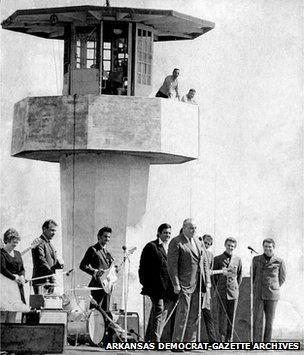
Rockefeller was the first-ever Republican governor of Arkansas. Cash was from a family of Democrats, but saw something he liked in Rockefeller and joined him in 1968 on his re-election campaign trail, playing concerts and promoting their mutual call for reform.
By the time of the Cummins concert, Cash was close to the peak of his career. In February 1969 he had recorded the follow-up to Folsom Prison, Live at San Quentin, which would go on to sell even better than its predecessor, and ABC had just commissioned the weekly Johnny Cash Show which would turn him into a prime time TV star.
As well as singing for the prisoners, Johnny used the platform of the concert, which was being filmed for local TV, to put his money where his mouth was, offering to donate $5,000 (£3,000) of his own money to build a prison chapel – and publically challenging Governor Winthrop Rockefeller to match his donation.
“Old Winthrop, that day he wrote a cheque for five grand and put it in the chapel fund,” smiles Daniel Merry, savouring the memory.
Cummins today is a very different place to the “dark and evil world” a federal judge declared unconstitutional in 1970. It’s a modern prison focused on reforming inmates and preparing them for a return to society.
The chapel for which Cash had campaigned so passionately is one of the lasting legacies, not only of Cash’s visit to Cummins but of his entire prison reform crusade. It is durable concrete evidence of Cash’s interest in and commitment to the men he met behind bars.
Wilson Banks, the present day chaplain tells me there are still two or three lifers at Cummins who were there over 40 years ago when the Man in Black came to visit. “They say that he touched their lives.”
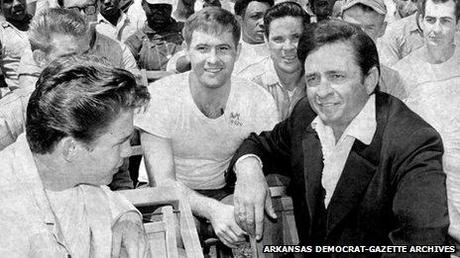
Cash’s conversations with the men he met at Cummins clearly touched him too. At the 1972 US Senate hearing, Cash relayed stories of some of the worst abuses he had heard of on his prison visits, including the harrowing tale of a 15-year-old boy who died of injuries caused by his rape at an Arkansas prison.
Former inmate Daniel Merry says he remembers the boy and there were “many more like him”.
Cash not only outlined to the senators on Capitol Hill what he thought was wrong with the American penal system, he also told them how he believed it could be improved.
His proposals included the separation of first-timers and hardened criminals, the reclassification of offences to keep minor offenders out of prison, a focus on rehabilitation rather than punishment, and counselling to prepare convicts for the outside world and reduce the possibility of them reoffending.
At a time when countries around the world are still wrestling with the question of how to handle those they incarcerate, many of the issues Cash raised that day feel just as relevant today.
The fact that we are still debating them 40 years later suggests Cash failed. But did he?
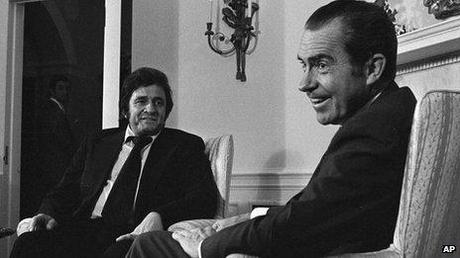
The sweeping reforms he advocated to politicians may not have come into force in his lifetime, and some have still not been achieved even now, but, using the power of his celebrity, he took the debate from politicians’ offices and the inside pages of broadsheet newspapers, into public hearts and minds.
Cash himself said during the US Senate hearing, “people have got to care for prison reform to come about”. His greatest legacy is that he made people care, through his public statements, but most powerfully and effectively, through his music.
For the average person, listening to one of Cash’s prison albums, with their songs of prison life, interspersed with convicts’ shouts, warders’ tannoy announcements and rattling keys, was to be transported into a world that was, until then, largely unknown or ignored.
It’s unlikely the changes at Cummins and other American prisons – and the push towards a view of imprisonment that tempers punishment with rehabilitation – would have come about without this shift in public perception.
Cash successfully humanised the prison population and gave them a voice. He had a unique ability to get inside the heads of these forgotten and ignored men and understand the problems facing them – the roar from the inmate audience that can be heard on Live at San Quentin when he launches into the provocative angry title track is testimony to this.Perhaps Cash’s impact is best summed up in the words of Senator Quentin N Burdick, one of the men he addressed at the US Senate in 1972.
Having heard Cash’s testimony, Burdick said, quite simply: “We need more Johnny Cashs, I guess.”
Danny Robins was reporting for a two-part Your World documentary for BBC World Service: Johnny Cash and the Forgotten Prison Blues. You can listen to the part one, and part two on iPlayer.
